-
UNDER THE OPEN SKY すばらしき世界 (Miwa Nishikawa 2020)
MIWA NISHIKAWA: UNDER THE OPEN SKY すばらしき世界 (2020)
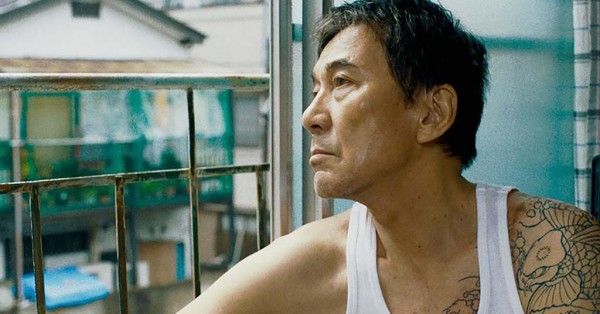
KOJI YAKUSHO IN UNDER AN OPEN SKY
Saga of an ex-con who tries to go straight
For her prisoner's tale director Miwa Nishikawa, a longtime associate of Hirakasu Koreeda, departed from her practice and adapted someone else's text, the 1993 Naoki-prizewinning novel Mibuncho (Identity Book) by Ryozo Saki. A formidable choice: the novelist's Vengeance Is Mine became Imamura's masterpiece. (Saki acknowledged the influence on his work of Truman Capote's "non-fiction novel" form, and this new movie teams with material.) Another valuable asset, by a good margin the most valuable, was the choice of the great Koji Yakusho to play the lead. The performance has won prizes and been called his career best. This film has much to teach us. But for all that, it seems somehow to lack a center and to be marred by excesses, too much detail, too little structure, moments of sentimentality, and a finale that gives way to melodrama. It's always a vivid, memorable film, one that takes us into a weary, suffering life as vividly as Bresson. But artistically it lacks finesse. That doesn't keep it, though, from being memorable.
What we learn are the specific details of something we already know: rehabilitation ain't easy, and assimilation is well-nigh impossible, especially in conformist, judgmental, legally rigorous Japan. The prisoner, Masao Mikami (Yakusho), has just served thirteen years for murder. He goose-steps and shouts out replies to officials obediently. He chooses to discard an expensive watch among his stored belongings that has gotten rusty. He mumbles "Screw you" and gets on the bus. He tells himself this time he will go straight.
As time goes on we learn that he was a driver for the yakuza (not strictly a member), that he was abandoned to an orphanage at age four by his geisha mother. His involvement in crime started early and he has spent 28 years in prison (nearly half his life). He also has a violent temper, and high blood pressure - a dangerous combination.
Once he's moved into a small flat, which he keeps very neat, Mikami tries to embark on a straight life. It doesn't work well. To renew his long-expired driver's license he must take lessons, and perhaps strangely, given his former job, he's terrible at driving. There are barriers at every step. The society does not want convicted felons. He has learned to be skillful at sewing leather in prison, but if that's where he learned it, a firm won't hire him. Identity Book, the name of Ryozo Saki's novel, refers to a peculiar Japanese institution, a collection of complete details about a prisoner that becomes available to people on the outside, which goes far toward making "a clean slate" impossible.
Mikami is surrounded by people he did not know who want to help him and several of whom become his friend. Souji (Isao Hashizune) is a lawyer who likes to help former prisoners, and he and his wife spend time with him early on. Tsunoda (Taiga Nakano) and his producer Yoshiawa (Misami Nagasawa), are TV people who film Mikami, thinking to make a show. They promise to help him find his mother, and this becomes a sustaining dream, a hope. A regular on the scene is the welfare officer Iguchi (Yukiya Kitamura), who is humbled by Mikami's rejection of handouts. Nearly as important as Tsunoda, who after being terrified by Mikami, begins to love him, is a local supermarket manager, Matsumoto (Seiji Rokkaku), who atones for wrongly accusing Mikami of shoplifting by giving him gifts and becoming a friend and advisor.
Mikami was in prison for killing a yakuza man who was menacing him and his wife with a sword. The film goes into too much detail about this, and introduces it in a gratuitous manner, even adding a courtroom scene; but what we learn is that it could have been considered justifiable homicide. Mikami is a man of violence and anger, and the many times he stabbed the assailant led to the murder charge and conviction. His violence is often in a good cause. Such is the case when he is with Tsunoda and his partner Yoshiawa and attacks two young punks bullying a helpless person. Tsunoda films this eagerly: a great scene for the series! But then Mikami becomes so violent it terrifies Tsunoda and he runs away. Yoshiawa chases and mocks him as a coward. She's finished with him, and apparently the filming for TV is over, and Tsunoda, estranged from Yoshiawa, begins following Mikami alone, without a camera, focusing on his original plan of writing a novel.
There is much more that will happen, including a vivid return to Mikami's hometown, Kyushu, to see his old yakuza buddy, Shimoinaba (Hakuryű), and his wife Masuko (Midoriko Kimura) and, on the way a very kind and lovely sex worker. As David Ehrlich says in his somewhat cruel IndieWire review, Koji Yakusho "knocks every scene" he's given to play in this film "out of the park," but one may indeed wonder if after a while "the movie around him" may begin "to feel like batting practice." (But see also Maggie Lee's extremely favorable Variety review, which also feels valid.)
As I watched Under the Open Sky (which fits the final shot of the film; but the Japanese title is the ironic one, "Wonderful World") in the back of my mind I compared it with 26-year-old Oudai Kojima's debut feature, Joint, another film in this year's NYAFF about an ex-con with yakuza connections finding his way on the outside. I was thinking not about Joint's conventional (but very contemporary) yakuza details, but about how the protagonist, a younger man, sets himself up after prison by working for two years far from Tokyo in construction and saving up enough money to set himself up in business. It's hard, and he only did two years in prison, but relatively, it goes so much easier - because he is not trying to go straight - quite. What emerges from Under the Open Sky - in fact it is repeated to us explicitly more than once (another weakness of the film that it spells everything out so much) - is that society pushes criminals to stay criminals, in Japan, anyway. Isn't that the life they have chosen?
Under the Open Sky すばらしき世界 (Subarashiki Sekai, "Wonderful World"), 126 mins., debuted at Toronto Sept. 10, 2020; it was also shown Oct. 23, 2020 at San Diego Asian Film Festival;at Chicago Oct. 2020 Koji Yakusho received the best actor award; Nov. 25, 2020 at Warsaw (Five Flavors); Dec. 5, Macao; Japan theatraical release Feb. 11, 2021; festivals in 2021 at Seattle, Jeonju, San Francisco, Barcelona, Tokyo IFF (internet), Frankfurt, Toronto Japanese Fest. (internet) Jun., Shanghai (Jun.), Pyeongchang (Jun.), Montreal (Fantasia, Aug.), and it was screened for this review as part of the 2021 NY Asian Film Festival (Aug. 6-22).
Last edited by Chris Knipp; 08-17-2021 at 11:28 PM.
-
HOLD ME BACK ( Akiko Ohku 2020)
AKIKO OHKU: HOLD ME BACK 私をくいとめて(2020)
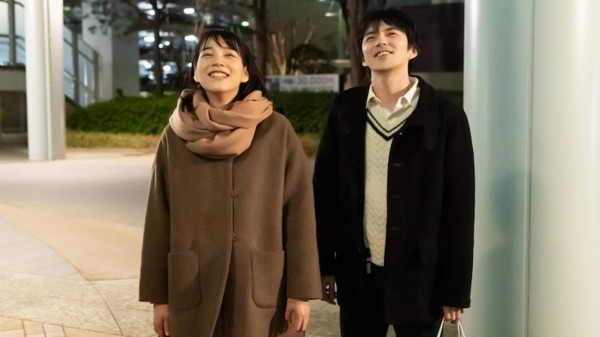
NON, KENTO HAYASHI IN HOLD ME BACK
TRAILER
Taking it slow
Adapted from the novel by Risa Wataya, this movie is about a young Tokyo woman on the far side of her twenties called Mitsuko (Nun) who has not been dating for a while. She talks to an imaginary man she calls A for "answer." Below her apartment lives someone who practices Khoomei, or Tuvan throat singing. She has a best friend at work, Nozomu San (Asami Usuda), and a childhood friend, Satsuki (Ai Hashimoto), who she goes to visit in Rome. And she has Tada (Kento Hayashi), a shy, lonely single of the opposite sex she knows from work. "Tada kun," as she addresses him, like a pal, starts to come over once a week, but only to collect a dinner she makes for him, without coming in, the only connection they have so far been able to arrange. One evening he finally comes in to consume the meal, only to leave immediately after doing so. (I was bothered by the fact that Hayashi is three years older than Nun and looks it, while Tada is supposed to be two years younger. Since they made an issue of it, it might have been better to find an actor who looked younger, not older, than Nun.)
The film is a quirky, sometimes fantastic, look at the phenomenon of singularity and loneliness among Japanese young people who may sometimes lack, or feel they lack, the wherewithal or even the courage to date, let alone to marry. Mark Shilling, of The Japan Times, compares the star, Nun (Rena Nounen), to Marilyn Monroe, because she seems to have a childlike, spontaneous femininity. For ten seconds I thought of Diane Keaton. Mitsuko doesn't have as many options. She plans spa visits and restaurant dinners to do on her own. And she goes to Rome to see that old friend, Satsuki, by herself: we see her through a somewhat troublous flight, with much turbulence and little sleep. It's really Rome, and Satsuki's Italian in-laws are there, all speaking Italian.
When Mitsuko and Satsuki have some quiet time together they share memories and nostalgia of younger days. Satsuki, who is pregnant, assures Mitsuko that despite her supposed bravery in marrying an Italian and moving to Rome, her world is even more confined than Mitsuko's. As Satsuki, Ai Hashimoto makes her appear an extraordinarily poised and beautiful woman, but she makes it clear that keeping it together is not that easy. In the trip to Rome one has the strongest sense of Mitsuko actually doing something, and this is the segment of the film that seems most real. However, it is an elaborate way of developing the usual rom-com "girlfriends" thread, taking the actual rom-com nowhere. Perhaps this explains why this film with so few characters and events runs to over two hours.
In the event, back in Tokyo Mitsuko texts her way to renewed contact with Tada, though whether he or "A" matters most to her remains somewhat uncertain. She is afraid of being abandoned by her imaginary friend, in case her boyfriend doesn't become that. But on a double date for a Valentine's Day climb of the Tokyo Tower with Nozomu San and her crush, the colorfully dressed Carter (Japanese-American actor Takuya Wakabayashi), who she's finally landed a date with, Tada proposes that he and Mitsuko officially date. Later they go to a hotel with a double bed but - spoiler alert - don't kiss, and don't undress: Tada wants to "take it slow."
They sure do. This reminded me of Emmanuel Moiret's 2007 Un baiser, si'l vous plaît? (R-V 2008), a French rom-com where a lot of discussion takes place about whether to kiss. This concern seemed amusingly old-fashioned. In Japan perhaps circumstances predetermine shyness to a greater extent.
Hold Me Back 私をくいとめて, 133 mins., debuted at Tokyo Nov. 5, 2020 (Audience Award); Japan theatrical release Dec. 18; Helsinki Apr. 2021, Taiwan theatrical release Apr. 2021; Toronto (Japanese Film Festival, internet), Jun. 2021; Shanghai, Udine, Jun.; Montreal (Fantasia) Aug. 5; screened for this review as part of NY Asian Film Festival (Aug. 6-22).
Last edited by Chris Knipp; 08-17-2021 at 11:38 PM.
-
A SONG FOR YOU 他与罗耶戴尔 (Dukar Tserang 2020)
DUKAR TSERANG; A SONG FOR YOU 他与罗耶戴尔(2020)
TRAILER

DAMTIN TSERANG IN A SONG FOR YOU
Rural Tibetan singer seeks pop marketability
A Song for You, Tibetan version, starts out with a swashbuckling swagger from its great-looking young protagonist Ngawang (Damtin Tserang) a nomad and shepherd-singer's son from the high Tibetan plateau part of southwestern China, riding in on a motorcycle with a black helmet, which he neglects to take off when he enters a room. Ngawang is going forth with his long-stringed mandolin and the intention of conquering the world. He wears his long sheepskin coat like a royal robe, his skin is olive and glows, his wide mouth has a sensuous twist, his almond eyes are soulful, and his hair is glossy and long. In his rural Tibetan way he's a readymade rock star. He will be tamed and commodified before the end, though we're spared the details, just shown the video disc album he gets made and some quick clips of him performing.
My hopes ran high when I saw that Jia Zhangke was a co-producer of this film, whose first-time director is known already as a sound and musical composition man. Marko Stojiljković of Asian Movie Pulse says he's "one of the most influential score composers and sound guys (handling everything, from design, via recording, to mixing) of the Tibetan cinema scene." So the tech side, both heard and shown, is authentic as can be. Music and sound design throughout by Dukar Tserang, of course. The drama side seems a little harder for him to keep going.
The thought that this rural Chinese setting might evoke the unpredictable complexity and cultural strangeness of Jia's early films was like a shot of adrenalin. But that doesn't happen. Tserang isn't as adventurous or gifted a director, the "star is born" theme is too hackneyed, and the milieu is mostly so rural (or invented and detached from the available reality) that its cultural content stays relatively thin.
Young Ngagwng doesn't conquer the world when he comes in from the bled, of course. He enters a little song contest and wins no prizes. It teaches him he's not the star he thinks he is and he learns he needs to get a record out before the public will pay attention to him. He meets a beautiful young woman singer who likes him, and they connect. Back home, he curses the big amulet he wears around his neck from his father, thinking it's lost its power. But the old picture inside it resembles the girl, and he starts to think she is the incarnation of what he calls Loyiter: Saraswati, the goddess of song and music. His father, to whom he is close and who encourages him, persuades him to keep the amulet. Good thing: it's an essential part of the "look."
Damtin Tserang never stops looking good, but he hasn't much to do in the rest of the film but be deflated and remain determined, and sometimes combative, whether against highway bandits or commercial studio nitwits, till finally he gets a studio gig and the poster and album out there. As a presence Tseramg can be a little zoned out-seeming, and the action doesn't necessarily pop when he's onscreen, nor the movie fully command its 93-minute run-time - short though, by the standards of this year's NYAFF roster, that may be. At one point the car Ngagwng is in out on the mountainous plain crashes and rolls down a hill; he soon recovers. The girl reappears; a pal (Pema Jyad) does too. His father he stays with by cell phone keeps supporting him - but he can never see him again.
When Ngawang gets to Xining to make his record, the big town of the Tibetan plateau (whose skyline we repeatedly gaze upon), he has raised money helped by friends. The traditional story line falters here: the album gets made; there are some hitches; so what? It's as if the first few sequences were as far as director Tserang had the filming planned, and inspiration faltered a bit. Lovely milieu and cast here, true details of the Tibetan music biz, but the structure gets in the way.
(Not sure where this narrative fits into the "free Tibet" story; but the protagonist sacrifices his native folk flavor to become a marketable, video-delivered pop singer, for sure.).
A Song for You 他与罗耶戴尔, 93 mins., debuted at Pingyao (the fest co-created by Jia Zhangke in 2017), Oct. 2020, also shown at Osaka Mar. 2021, at Rotterdam Jun. 2021 (internet). Shown Aug. 14, 2021 at the NY Asian Film Festival (Aug. 6-22), screened as part of that event for this review.
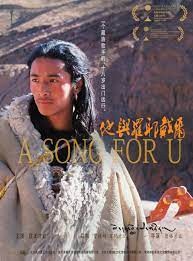
Last edited by Chris Knipp; 08-23-2021 at 05:22 PM.
-
SAMJIN COMPANY ENGLISH CLASS 삼진그룹 영어토익반 (Lee Jong-pil 2020)
LEE JONG-PIL: SAMJIN COMPANY ENGLISH CLASS 삼진그룹 영어토익반 (2020)
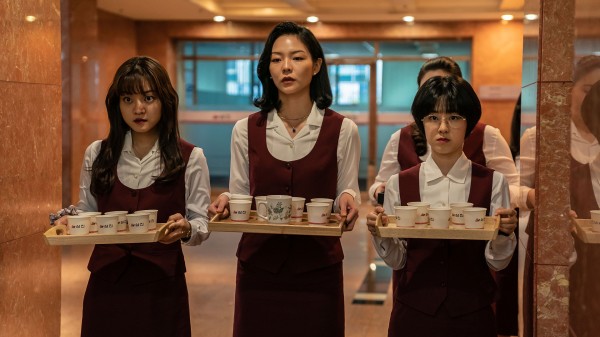
GO AH-SUNG, ESOM, PARK HYE-SOO IN SAMJIN COMPANY ENGLISH CLASS
Women crusading against corporate corruption (sort of)
Samjin Company English Class adopts an entertaining style to present an edifying story. Given the enthusiastic audience response and the enjoyable ensemble performances, it may seem ill humored to point out that its charm undercuts the movie's intended serious message. Erin Brockovich, which has been mentioned as a comparison, has a light side too, but it's pretty serious, and its focus on a single person's intensive crusade is different, because Samjin's crusaders are three low-level women employees. One focus is how a company corruptly covers up pollution that's killing people. Another is on the repression of women workers in Korea. The setting, accordingly, is 1995. The implication is that things have gotten better.
Personality-plus Lee Ja-young (Go Ah-sung), Jung Yoo-na (Esom) and little math whiz Sim Bo-ram (Park Hye-soo) are friends and co-workers at Samjin Company. They are (only) high school graduates, and, putatively for that reason, after eight years they're underlings in the office, still buying cigarettes, making coffee, and helping men find their files or fire up their computers. They wear matching outfits, by the way, like schoolgirls. Probably they know more than the men who treat them like servants, but they're stuck. An opening has appeared, because it's been announced that a score of 600 on the Toeic English test will get them a promotion to assistant manager.
Somebody has been gifted a tropical fish in a bowl. Lee Ja-young takes it out to the country to release it into a stream - and then sees the stream is full of dead fish, and a large pipe is emitting waste into the water. All the action follows from here. An investigation; agreements signed by locals to accept nominal compensation; falsification of the report; shredding of the original report (by a low-ranking man) is ordered. Eventually, nonetheless, the ladies win. There's a plot twist to accomplish this. The whole catastrophe has been used as a way to enable purchase and incorporation of the company by an international firm. This is the trio's wedge, because they organize the shareholders against the corrupt administration.
A small cadre of evil Americans make up the baddies of the piece, by the way, which leads to a typically spicy "Letterboxd" comment (from Júlia Falcăo): "the way Koreans always hire the worst ever white actors to play all the white characters... iconic." The English teacher (Tyler Rasch) is loud and specific in his constant off-the-wall instruction consisting of company slogans or alleged sayings included on previous Toeic Tests. He is sad because he is an illustration of how bad English classes can be; and whenever the women say something in English, I can't make out a word (Koreans would get subtitles, but we don't). More inexplicable is the unxious, tall, allegedly "handsome" company "President" Billy (David Lee McInnis, an actor living and working in South Korea), who understands Korean but replies nearly always in English. Two Americans are nondescript, thuggish heavies in the background manipulating things for upper management. There is also John D. Michaels, apparently another American actor living in Korea, as the "MIT" Global Capital Executive.
All this is part of a needlessly complicated plot that provides many evil high company officials when one or two would have done better. Likewise the hurried scheme to undermine global capital's effort to take over the company substitutes complication for believability. Erin Brockovich, with Julia Roberts' gratuitous cleavage and Steven Soderbergh's disappointingly (after all the hype) merely workmanlike direction, is hardly a model of filmmaking subtlety and complexity, but it does give the sense of depicting real events, whereas Samjin Company English Class is more an eye-popping, momentarily distracting cinematic twittering machine, which leaves one unsatisfied and perhaps a little confused. It is slick, entertaining, and in parts, in its way, well acted. The three central ladies never cease to be watchable and charming. But this is not a good movie. Maybe the younger Korean audience learns something from it about women at the workplace before they were born. Let's hope so. And let's hope it's better now.
Samjin Company English Class 삼진그룹 영어토익반, 110 mins., has released between Oct. 2020 and July 2021 in South Korea, Singapore, Indonesia and Japan. Screened for this review as part of the Aug. 6-22, 2021 NY Asian Film Festival (shceduled for Aug. 14, 2021).
Last edited by Chris Knipp; 08-20-2021 at 02:34 AM.
-
THREE SISTERS 세 자매 (Lee Seung-won 2020)
LEE SEUNG-WON: THREE SISTERS 세 자매 (2020)
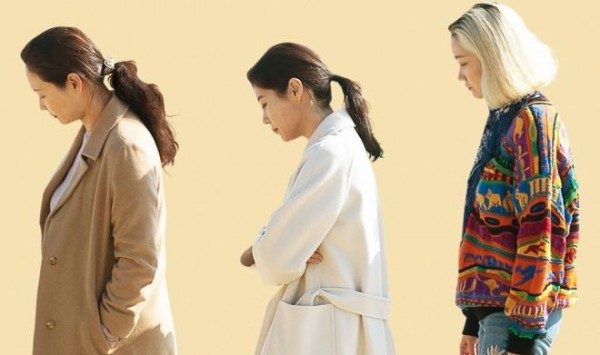
KIM SUN-YOUNG, MOON SO-RI, AND JANG YOON-JU IN THREE SISTERS
Old complaints revisited
Director Lee Seun-won says in an interview (by Joan MacDonald, in Forbes) that he hopes his movies will offer escape and satisfaction, which he said he got when he "ran away from home" and went to the cinema as a youth. How does he think this depiction of three dysfunctional women, the victims of childhood trauma, provides that kind of satisfaction? Perhaps through the terror and pity, catharsis and purgation of Aristotelian tragedy, for Lee Seung-won is primarily a dramatist.
The title notwithstanding, this material is closer to Bergman than Chekhov. Each sister is also a wife and mother, uneasy in both roles, and living in a different kind of trap. The eldest sister, Hee-sook (Kim Sun-young), is an impoverished divorcee who has become ultra-pathetic, always apologizing, sometimes abjectly. She is a not very successful florist, married to a loser husband, who till now hasn't been able to tell anyone, not even her rebellious punkish daughter Bo-mi (Kim Ga-mi), that she has been diagnosed with cancer.
Most polished, successful, and well-off is the middle sister, Mi-yeon (Moon So-ri) a born-again style Catholic choirmaster who can’t get her children to follow the faith as well as she’d want them to and terrifies her little daughter for not being able to say grace. Her barely repressed anger comes out when she learns that her university-professor husband, who turns out to have come to find her insufferable, is now cheating on her with one of her choir members. We spend the most time with Mi-yeon, and it is not an easy time.
The youngest sister, Mi-ok (Jang Yoon-ju), meanwhile, eccentric, colorfully dressed, bleach-haired, wildly outspoken, is an alcoholic playwright, unproductive, troubled with memories she can't access she bugs Mi-yeon about, with little control of her impulses and appetites, yelling even at strangers. She's trying ineffectually to deal with a stepson contemptuous of her and her alcoholic ways, while her well-off greengrocer husband is surprisingly indulgent and still seems to find her attractive. While the two younger sisters talk and meet up at times when Mi-eon feeds Mi-ok, who lives mostly on junk food, a decent meal, neither of them has seen Hee-sook for a while.
We can tell as the film cuts back and forth among the three women's lives that they are all badly damaged, even the precise, well-ordered Mi-yeon, whose superficially pious, religion-based life reflects its own kind of desperation. But each of the three is too vividly, too independently, imagined: it's hard to make out what they all have in common, given that their personalities, occupations, and economic levels are so different. They don't seem related. But these are three wonderful performances, and each role is an actor's feast that they separately devour, and it's for the acting that we watch the film rather than for the film that doesn't quite hold together.
The filmmaker, with his theater background, having made the film cinematic with cross-cutting and flashbacks, brings things to a dramatic climax at film's end by intercutting black and white images of the siblings' grimly miserable, impoverished childhood with an alcoholic, physically abusive father who alternately beats them - intercutting some shocking tastes of this miserabilism with the present-time staging of a reunion party at a restaurant private dining room in the sisters' hometown for their father's birthday. Here, their younger brother, whom we have not seen hitherto, behaves in an aberrant manner that brings things to a crazy, shouting, self-damaging finale and makes the lunch party impossible to complete. Everything comes out, and the now elderly dad seems, when pushed, extremely contrite. A coda in which the three sisters gather later for a smiling selfie on the beach seems tacked on and unnecessary, and adds to the feeling that the all-stops-out birthday finale is overbearing and doesn't build sufficiently on what has come before. You have to put it all together in your head; but it's so intense, maybe you can.
Three Sisters 세 자매, 114 mins., premiered at Jeonju Sept. 18, 2020, opening in Korean theaters Jan. 27, 2021, showing at Osaka Mar. 5, 2021. At the Baeksang Arts Awards Kim Sun-Young won Best Actress; her two costars were also nominated; all three were also nominated at the Chunsa awards. Screened for this review as part of the (Aug. 6-22) 2021 NY Asian Film Festival (internet), where it showed Aug. 18, 2021.
Last edited by Chris Knipp; 08-20-2021 at 08:34 AM.
-
A LEG 腿 (Chang Yaosheng 2020)
CHANG YAOSHENG: A LEG 腿 (2020)
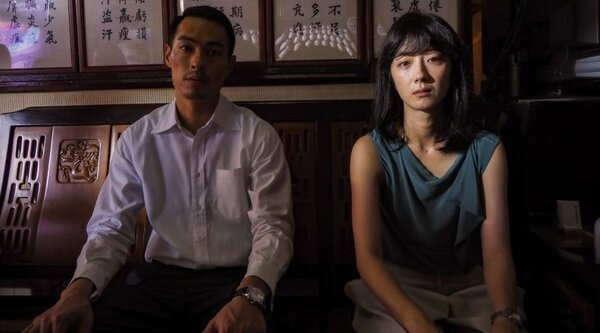
TONY YANG, GWEI LUN MEI IN A LEG
TRAILER
Vicissitudes of a wayward life concentrated in a limb
Chang Yaosheng has distinguished himself in Taiwan as a novelist, then a screenwriter. In the past few years he has begun directing. He seems to have a particular concern with couples and the afterlife. His previous feature, bluntly entitled in English See You After Life, has been described as a tale in which "The murdered father's ghost comes home to drag the mother to the very end." The new one, a drag in its own way, described as "a dark romantic comedy," is based on the experience of the filmmaker's own parents. It concerns a wife, Qian Yu-Ying (the dryly ironic Gwei Lun Mei of Wild Goose Lake and Black Coal, Thin Ice), who hounds the hospital to give back the amputated leg of her dead husband Zheng Zi-Han (the dangerously handsome Tony Yang/Yáng Yňuníng) so that he can be cremated whole. Chang's own parents hadn't been on good terms for some time. When the leg was restored and the body cremated, Chang said in an interview,* his mother felt disposed "for him to go a long way away and never come back." In this screen version Qian may be vainly seeking to bring back the man she loved. But as their relationship unfolds, perhaps it's to achieve a wholeness that never was. On CineFiles, Alex Brannon breaks down this frantic search into "a quirky take on the denial phase of the grieving process." That too, no doubt.
Qian's partly Kafkaesque, partly ludicrous pursuit of the missing limb alternates with a story in flashbacks of the couple's life together. Whether that's drawn from the filmmaker's family, we don't know. It's a tale both romantic and tangled and interlaced with Chinese aphorisms. Though Zi-han gets to narrate his life with Qian Yu-Ying, it turns out there's a lot more than a limb to put together in their crumbling marriage, and his wayward, irresponsible life. First they met, through Zi-han's photo studio friend from high school, John (Zhang Shaohuai), on a ballroom dance floor. He was a competitive dancer, and in her he found the perfect partner. By what conceit was that enough excuse to marry? Through the desire to make a lot of money and make Qian happy, Zi-han falls in love with the mystery and danger of high stakes gambling. That indirectly causes him an unwise jump that ends his dancing career and so they open a ballroom school, but his unwisdom continues. Zi-han has a real gift for wrong decisions (and Chang Yaosheng for making them up).
One of my favorite scenes is the one where the couple come home and find their new house, bought out of foreclosure, occupied by a dozen shirtless, tattooed young gangsters. That'll change a room. (Wrong kind of foreclosure.)
The cinematography of Chung Mong-hong gives us grace notes, enhanced by the sets that include on-the-run things like the hallways of a hospital and the ballroom of an actual dance contest in progress. This dp knows the value of blurs of red around dancing figures. Chris Doyle might approve.
A Leg 腿, 115 mins., cowritten with Chung Mong-hong, as was the latter's award-winning, Oscar-shortlisted 2019 A Sun , debuted at Taipei 2020, receiving multiple award nominations; also shown at Tokyo and Hong Kong, all in Nov. 2020. Taiwan theatrical release Dec. 2020. Screened for this review as part of the 2021 NY Asian Film Festival (Aug. 6-22).
*So Chang recounts in the NYAFF Q&A with David Wilentz.
Wikipedia entry for A Leg.
Last edited by Chris Knipp; 08-20-2021 at 07:13 PM.
-
MY MISSING VALENTINE 消失的情人節 (Chen Yu-Hsun 2020)
CHEN YU-HSUN: MY MISSING VALENTINE 消失的情人節 (2020)

PATTY LEE, LIU KUAN-TING IN MY MISSING VALENTINE
Frozen in a \magic realist Taiwanese rom-com
My Missing Valentine takes us to a rom-com world partly in the spirit of Jean-Pierre Jeunet's Amélie, where the quotidian is celebrated and transcended through magical alterations of ordinary reality: the two main characters are plum in the center of everyday life, she a post office employee and he a bus driver. The story revolves around 30-year-old wallflower Yang Hsiao-chi, the postal clerk (played by game, girlish TV hostess Patty Lee), and moves between the Taiwan capital of Taipei and the seacoast town of Dongshi, two completely separate worlds, both everyday, and both characters will spend time at the seaside.
My Missing Valentine may seem slightly odd in the way it manipulates its characters and the way they manipulate each other. Some writers, including a reviewer for The Taipei Times , Han Cheung (though it's more an editorial than a review and he's listed not as film critic but "staff reporter"), have diagnosed its characters' behavior as "stalking" and considered it very inappropriate. This is absurdly literal-minded and misunderstands the wacky rules of romantic comedy; but in any case this is a highly accomplished and much admired piece of work, and was rewarded accordingly with a raft of prizes at the country's Golden Horse Awards, Taiwan's equivalent of the Oscars, including Best Feature and Best Director.
The wallflower-postal clerk Hsiao-Chhi and the oddball bus driver A Tai (Liu Kuan-ting) are each out of sync with the world, unstuck in time but in opposite ways. She is a second or two ahead of everybody and he is a little behind. A funny quick history has shown her jumping the gun at school races, laughing too soon at movies, and so on. Years ago her father went out to buy tofu pudding and never came back. Despite this, Hsiao-Chhi is cheerful, with a warm smile for her customers, but she's lonely. At home, magically a talk-show host, Gecko man, appears at her window and talks to her at end of day. She never has cause to celebrate Valentine's Day, which is coming up again. But while she's walking across town a buff, handsome young man with a moustache, Liu Wen-sen (Duncan Lai), who teaches a free outdoor dance-aerobics class, runs after her and flirts with her and invites her on a date. Later he seems to disappear, though flashbacks or closeups show that he's a con man, lying to people and dating multiple women.
When Hsiao-Chi wakes up later it seems Valentine's Day has passed and she's missed an entire day of time.
A Tai's story is more complicated, intimate, and touching. It would probably be a spoiler to go into his earlier connection to Hsiao-Chi, but they have a special one, it turns out, and she seems to come to appreciate it and care about it, maybe more than about anything else. A Tai from the first has come to the post office every day to mail a letter, which he tries to mail at Hsaio-Chi's desk. His interest in her seems a bit mysterious at first. (Later, it's not.)
Though Hsiao-Chi is the "protagonist," in a way, A Tai assumes a very central role in the second half of the film, when events draw the pair together. One thing that's very funny and fascinating is the way A Tai seems to drive his bus around, or stop it, just as suits his fancy, manipulating the passengers as he likes. This is a preview of a long passage, the most unique in the film, where all over Taiwan people freeze in motion, all except A Tai. (This is a special effects tour de force of no mean proportions.)
Hsaio-Chi is on his bus. He can manipulate people like lego dolls, and shape them in different positions in which they stay. Did I mention he always has a camera with him, and likes to take people's pictures, both to memorialize them and to record their wrongdoings? (The cinematography of Chou Yi-Hsien, with its slightly nostalgic faded colors, is often beautiful, with a sense of posed pictures in it too, and many handsome middle-distance shots of urban and seaside landscapes.)
This snapshot-centric worldview is another charming and peculiar part of the film, especially during the passage when A Tai drives the bus full of frozen-in-place people, including Hsao-Chi, to Dongshi by the sea, and poses time-lapse shots of himself with her in different poses. It's not stalking: it's rom-com magic realism, wistful, sad, and very touching. And finally, after a lot of other stuff, it's looking like the lovers are coming together at the end - just in the very last frame. That's perfection!
To keep the firm grip on our heartstrings the music over the closing credits is the haunting Bee Gees sixties classic "I Started a Joke" sung by Robin Gibb.
The most discerning online review may be that of Steven Ng on Obsessive Cinema Disorder. I found it interesting what he says about the comic potential of the Taiwanese accent. The dialogue brought back good memories (perhaps mistaken) for me, of Takeshi Kaneshiro (who did grow up in Taiwan) in Wong Kar-wai's Chungking Express. As Ng notes, this is a movie that would benefit from repeat viewings - and not just for the Taiwanese dialogue. An admiring and thorough review among many niggling and slapdash ones is that of BH for Action.Cut.Review.
My Missing Valentine 消失的情人節, 119 mins., opened in Taiwan Sept. 18, 2020, and featured at Taipei Nov. 7, received 11 nominations at the 57th Golden Horse Awards, winning Best Feature Film, Best Original Screenplay, Best Visual Effects, Best Film Editing and Best Director. Also at Hong Kong Asian Film Awards, Seattle; Busan; Chicago; Udine; Neuchâtel; and it was screened for this review as part of the 2021 NY Asian Film Festival (Aug. 6-22), where it was shown Aug. 17, 2021.
Last edited by Chris Knipp; 08-21-2021 at 03:22 PM.
 Posting Permissions
Posting Permissions
- You may not post new threads
- You may not post replies
- You may not post attachments
- You may not edit your posts
-
Forum Rules





 Reply With Quote
Reply With Quote







Bookmarks